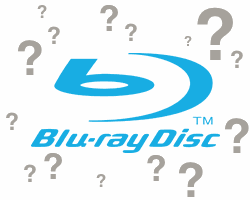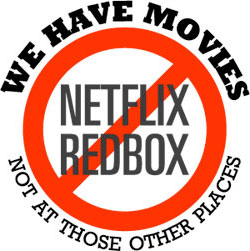Screw streaming, just give me my Blu-rays
Posted Friday, May 3, 2013 at 4:44 PM Central
Last updated Friday, May 3, 2013 at 5:02 PM Central
by John Couture

Do you know what I like about my DVD and Blu-ray collection? I like that if the desire ever were to cross my mind, I can grab my entire movie collection, throw them into a big pile in the middle of the room and roll around in them.
I know what you're thinking and, ew gross that's not what I was thinking. I was simply trying to use an illustrative example of ownership vs. leasing. When you buy a car, you own it. Well, after you make all of the payments assuming that you didn't roll up into the car dealership with a big bag of cash and bought the car outright. With leasing a car, you never truly own it and after the lease term is up, you have to give it back.
Actually the metaphor probably works better with buying a house vs. apartment renting, but I think you get my point.
This week, the streaming community expressed their outrage and incredulity over the so-called "Netflix Streamageddon", in which the online digital retailer lost the rights to nearly 2,000 titles from Warner Bros., MGM and Universal. I laughed. I scoffed. I simply threw in my Blu-ray copy of Deep Impact and enjoyed my own personal irony in the moment.
You see, all of the anger and frustration over this event was seemingly targeted squarely at NetFlix, and while I wouldn't ever claim to be a big fan of the online streaming component of their business, I have to say that, at least in this case, they aren't entirely to blame. You see, Warner Bros. is really the one to blame here, but you won't hear NetFlix saying that.
All of the Warner Bros. titles that vanished overnight from NetFlix, will magically reappear on Warner's own fledgling streaming site, Warner Archive, even if they aren't all on there right now. Think about it, why would you license your content to a competing service and lose that $10 per month subscription fee? Warner Bros. is a smart company, trust me they'll have those titles up on their Archive swiftly.
According to InstantWatcher.com, NetFlix currently offers 13,810 titles. So, if my math is still any good it would appear that they lost just north of 11% of their titles. Yikes. Last year, NetFlix lost a bunch of films when their licensing deal with Epix expired.
All of this loss just underscores how volatile the online streaming environment is right now. The last time I checked, Warner Bros. couldn't choose to recall The Dark Knight and break into my house to steal my Blu-ray copy. I won't even get into the whole argument that Blu-ray is by definition a better quality of the film than even the best streaming copy, but I digress.
The film studios aren't stupid. They take one look over at iTunes and say, "Hell no." The iTunes model will not work for films in the eyes of every studio (save for Disney) because they value films more than music, rightly or wrongly. That and studios are notoriously protective over their films, Paramount's recent decision to loan Warner Bros. basically their entire catalog notwithstanding, and don't want to give anyone else control over their property.
This mindset pretty much explains UltraViolet, which is the studios' response to digital downloading and streaming. Now, I'm not going to sit here and try to argue that UltraViolet is all that and a bag of chips, because it's not quite there yet. The signup process is clunky and a mess at best and the whole idea of using third party "retailers" like Vudu and Flixster to handle the streaming and downloading front side is lazy, confusing and just another hurdle to singularity.
What I do like about UltraViolet though is that it allows me to keep OWNERSHIP of my films. There's that word again. When I choose to purchase a Blu-ray combo pack that includes an UltraViolet copy of the film, not only do I have the physical Blu-ray (and in most cases a DVD), but I also purchase digital rights to that film.
Basically, that means that the film studio is granting me digital rights to that film from now until the day I die, no matter how the format or means of delivery changes. I know, I'm skeptical about that statement too, but it's certainly better than paying a monthly fee and then suddenly getting all of the titles ripped out from underneath me. And besides, I'll always have that Blu-ray copy and unless we as a society devolve into a totalitarian state, no one is getting my copy of The Dark Knight.
In the midst of all the upheaval, Netflix released a statement that said, in part:
We always use our knowledge about what our members love to watch to decide what’s available on Netflix. Our goal is to be an expert programmer, offering a mix that delights our members, rather than trying to be a broad distributor.
And there's the disconnect. I hate to say it Netflix but this statement just proves how out of touch you are with your customers. I'm willing to bet dollars to donuts that the majority of your customers do want you to be a broad distributor, offering as much as possible.
Look, I'm not a luddite. I would love nothing more than to be able to sit on my couch and push a single button and have the option to watch every single film ever made with the push of another button. I mean, come on, this is the future, damn it. Where's my flying car?
But, I'm also a realist. Much like the Flying Car, I'm sorry to have to break it to you: the magic, one-button option to view every film ever made will not happen in my lifetime. Or yours, if ever.
So, where does that leave us? That leaves us with an increasingly competitive market that sees Netflix, Amazon and the rest now having to compete with the studios themselves for content. You don't have to be a rocket scientist to figure out how that's going to end up.
That's why you're seeing Netflix and the other online streaming companies wade into the content creation arena. Did you know that their highly watched original series House of Cards is coming to Blu-ray and DVD on June 11? Well, it is and of course Netflix doesn't have an established home entertainment arm to handle distribution, so Sony Pictures is helping them out.
I'm not privy to any inside information here, but I'm willing to bet that the deal brokered between Sony and Netflix was a bit more complex than a simple distribution deal. I'm willing to bet that Netflix got new or continued access to Sony content as part of the deal. And since the Netflix app is native on the Sony PS3 and (I would imagine) the forthcoming Sony PlayStation 4, it's a win-win for all involved.
So, it's a real possibility that in the near-future, each studio will have their own digital service, for a nominal monthly fee and the big players now like Netflix and Amazon will survive, thanks mostly to their original content and sweetheart deals. With six major studios (seven if you want the Lionsgate/Summit films) and Netflix and Amazon, the monthly price for your online streaming could reach up towards $100. And that's before you pay for the high-speed Internet to deliver it.
Maybe the studios will rally together one day and give us a true one-button online streaming solution. And maybe cats and dogs will learn to live together. And everyone will agree on politics and religion. In other words, I'm not holding my breath.
No, I'll be holding onto my Blu-rays and you'll have to pry them from my cold, dead hands.





